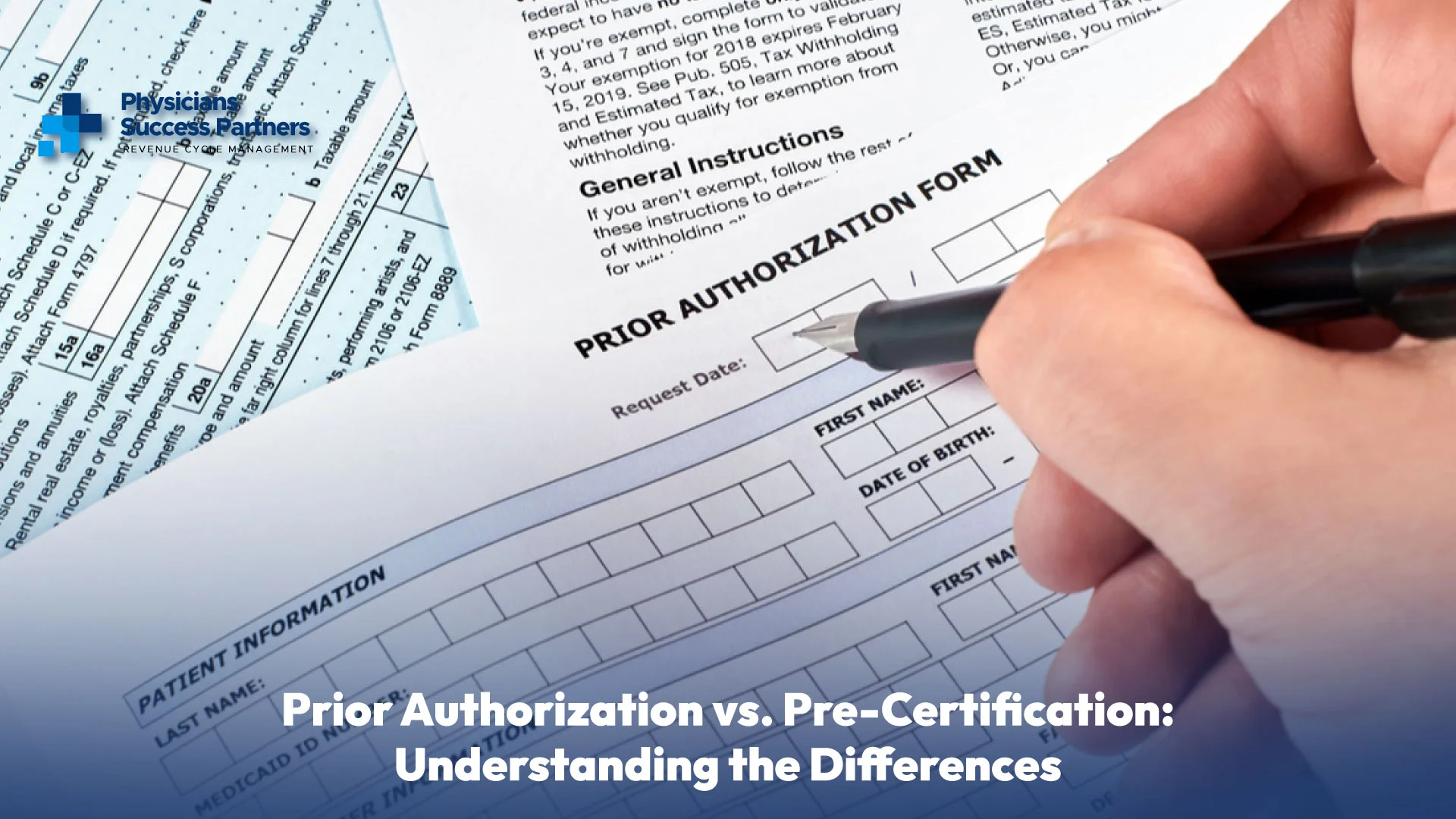Prior Authorization vs. Pre-Certification Understanding the Differences
Navigating health insurance can feel like a puzzle. Knowing what you need for medical approvals is important. Two tricky terms are pre-authorization and pre-certification. Both need insurer approval before a procedure, but they have different roles. Understanding these differences can help you find your way to coverage.
Both pre-authorization and pre-certification ensure that healthcare services are necessary and prevent unnecessary costs. They also prevent unnecessary costs. These processes help insurance companies manage costs. They also make sure patients get the right care. But what exactly do they mean, and how do they impact the insurance approval process?
Physicians Success Partners (PSP) offers solutions for claims and approvals. Our tools help healthcare providers simplify prior authorization and improve pre-certification workflows.
What Is Prior Authorization?
Prior authorization, also known as pre-authorization. Health insurance companies use it like a key. They require approval before covering certain treatments. This applies to medical procedures and prescription medications. Everything needs an acknowledgment of approval. Without this, your insurance claim may be denied.
Insurance providers use authorization requirements to prevent unnecessary treatments and control healthcare costs. Providers often need to look for lower-cost options before they approve a treatment. A doctor might have to use generic drugs first. Then, the insurer may approve a pricier brand-name medication.
How the Prior Authorization Process Works:
- A healthcare provider suggests a procedure or medication tailored just for you.
- Next, they send a prior authorization request to your insurance company.
- The insurer checks your request to see if it meets their medical necessity standards.
- If approved, you'll receive an authorization number for your claim.
- If denied, the provider can submit more documents or contest the decision.
The prior authorization process can delay the treatment. Getting approval might take days or even weeks. It helps avoid unnecessary medical procedures. It also makes sure that the most cost-effective treatments are considered first.
What Is Pre-Certification Meaning?
Pre-certification is key for health insurance. It decides if a medical procedure is needed before treatment starts. Pre-certification differs from prior authorization. It covers elective surgeries and major medical procedures, while prior authorization is for prescriptions and imaging tests. You must get pre-certification to access these important procedures.
How Pre-Certification Works:
- A provider submits a pre-certification request to the insurance company.
- The insurer’s medical review team evaluates the procedure’s necessity.
- The insurer may request medical records or additional documentation.
- If approved, a pre-certification number is assigned to the procedure.
- The procedure cannot proceed without pre-certification, or the claim may be denied.
Key Differences between Prior Authorization and Pre-Certification
Before starting your medical treatment, get prior authorization and pre-certification from your insurer. They have unique differences, much like the sun and the moon:
- Prior Authorization is often needed for prescription drugs, imaging tests, and ongoing treatments. It makes sure that cheaper or alternative options are tried first.
- Pre-Certification is needed for elective surgeries and major procedures. It confirms that the procedure is necessary before it happens.
- Prior Authorization can delay coverage if approval is not granted. Pre-Certification stops the procedure from happening without approval.
The Approval Process for Prior Authorization and Pre-Certification
In most cases, the patient does not need to be directly involved in obtaining prior authorization or pre-certification. Instead, the provider contacts the insurance company on the patient’s behalf.
Steps in the Authorization Process:
- Provider Review: The provider evaluates the medical necessity of the treatment.
- Submission: The provider submits an authorization request to the insurer.
- Insurance Review: The insurer assesses the request based on its coverage policies.
- Approval or Denial: The provider receives an authorization or certification number if approved.
- Appeals: If denied, providers can submit an appeal with additional documentation.
Why Are Both Prior Authorization and Pre-Certification Necessary?
Navigating insurance approval feels like a maze for providers and patients. However, these requirements aim to ensure affordable and sensible healthcare choices.
Benefits of Prior Authorization:
- Helps reduce unnecessary medical costs.
- Ensures patients receive effective treatment without excessive procedures.
- Prevents over prescription of expensive medications when generic alternatives exist.
Benefits of Pre-Certification:
- Ensures elective procedures meet medical necessity criteria before being performed.
- Reduces the risk of insurance claim rejection.
- Helps both providers and insurers manage healthcare spending more efficiently.
Both processes help create a better healthcare system. Insurers, providers, and patients collaborate to cut unnecessary costs and maintain quality care.
How PSP Helps with Prior Authorization & Pre-Certification
Healthcare providers often find prior authorization and pre-certification requirements time-consuming and complex. Physicians Success Partners (PSP) offers expert solutions for insurance claims processing. Our services make it easier to request authorizations. We also reduce claim rejections and improve the approval process.
Partnering with PSP lets healthcare practices concentrate on quality patient care. This also ensures smooth insurance approvals and quick claims processing.
Final Thoughts on Prior Authorization vs. Pre-Certification
Prior authorization and pre-certification are key steps in health insurance certification. Though they seem alike, knowing the differences is key for patients, providers, and insurers.
Healthcare providers meet authorization requirements. This helps make sure medical procedures and prescriptions are covered. It also prevents surprise insurance claim denials. The healthcare industry is changing. Staying informed about insurance pre-approval processes helps patients and providers manage billing better.
FAQs
1. What happens if prior authorization is denied?
When prior authorization is denied, providers can contest it. They can add more medical documents to clarify the need for the treatment or procedure. This detailed information shows why the treatment is necessary. Patients should also contact their insurance company. A quick call can help explain their claim’s denial.
2. How long does it take to get pre-certification approval?
Navigating pre-preauthorization approvals can feel slow and frustrating. Days can turn into weeks while you wait. The timeline depends on your insurance provider and the procedure's complexity. Each added layer can test your patience, but we aim for clarity.
3. Can a healthcare provider proceed with a procedure without pre-certification?
No pre-authorization, no coverage. Get certified first to avoid the full cost.























